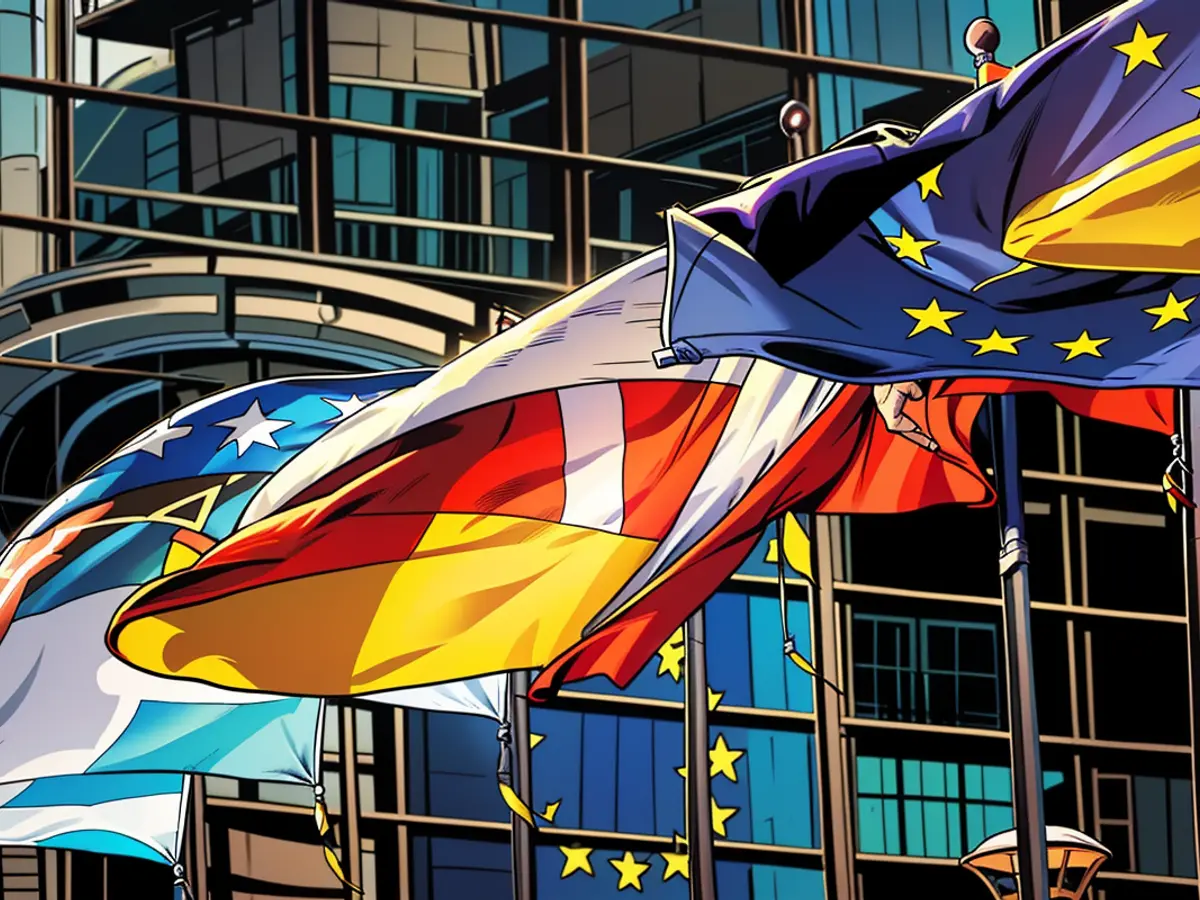The European Union - Six representatives from Hesse join the EU Parliament.
Following the European election with the CDU emerging victorious in Germany, there will be six representatives from Hessen in the upcoming European Parliament. The information from Wiesbaden's state election office on Monday stated that Sven Simon and Heinz Michael Gahler are from the CDU, Christine Anderson is from the AfD, Martin Karl Christian Häusling belongs to the Greens, and Udo Bullmann is a Social Democrat, with Engin Eroğlu representing the Free Voters. Hessen's CDU party won the European election on Sunday.
With the previous EU election in 2019, there were still seven Hessian politicians in the European Parliament. The FDP's Nicola Beer had given up her mandate around six months ago to become Vice President of the European Investment Bank in Luxembourg. At the time, her replacement in the European Parliament was Jan-Christoph Oetjen from Lower Saxony. Isabel Schnitzler, the Hessian FDP candidate for the election on Sunday, did not make it into the European Parliament. Currently, Germany is represented in the European Parliament with 96 members.
"A Stability Signal"
Hesse's CDU chairman and Minister President, Boris Rhein, views the CDU's victory as a signal for stability. According to him, the voters have sent a clear message for the CDU and against the federal government. The Union received almost twice as many votes as all three traffic light parties combined. "The Union is the last remaining people's party in Germany," Rhein remarked.
Rhein also addressed the losses of the traffic light parties (i.e., SPD and Greens) in terms of a potential new election in Germany. He said to Hit Radio FFH, "The question is, does the Chancellor even have a majority in parliament anymore." He suggested that Olaf Scholz (SPD) should provide clarity about whether there will be "new elections" or "a new justification of German politics." However, government spokesman Steffen Hebestreit assured on Monday, "The election date remains in the fall of next year as usual, and that's how we plan to proceed."
Victory of right-wing parties
Hesse's European Minister Manfred Pentz (CDU) questioned in an interview with Hit Radio FFH why people voted for right-wing parties in an interview with the station's website. His response was that they likely did so because they "wish that Europe would have a clearer and better migration policy." Anti-European parties are always a cause for concern, according to Pentz, as the future involves a united Europe in security, peace, and freedom. If Germany were to leave the EU like Great Britain, it would no longer be a player in the world.
The CDU gained 4.2 percentage points in Hessen compared to the EU election five years ago, thus securing 30.0 percent. The SPD followed in second place with 16.4 percent (minus 2.0 percentage points). The AfD gained an additional 3.7 percentage points, taking third place with 13.6 percent. The Greens lost 10.5 percentage points and placed fourth with 12.9 percent. The FDP managed to maintain its result almost consistently, earning 6.3 percent. The new party Alliance Sahra Wagenknecht received 4.4 percent in Hessen from its inception. There was a significant increase in voter turnout - it was 63.1 percent (2019: 58.4 percent). Voters aged 16 and 17 were allowed to vote for the first time in Hesse.
The outcomes of the European election 2024:
- European election 2024
Read also:
- The CDU's victory in the European elections in Hesse will result in six of their representatives joining the EU Parliament.
- Despite the CDU's victory, Germany is still represented in the EU Parliament with 96 members.
- Boris Rhein, the Hesse's CDU chairman and Minister President, views the CDU's victory as a stability signal for the party and against the federal government.
- Sven Simon and Heinz Michael Gahler are among the six CDU representatives from Hesse set to join the EU Parliament.
- Christine Anderson, a representative from the right-wing AfD party, will also join the EU Parliament from Hesse.
- The European elections took place in Brussels, with European Parliament elections happening across Europe.
- Engin Eroğlu represents the Free Voters in the EU Parliament, adding to the diversity of voices in the EU Parliament.
- The SPD, led by Olaf Scholz, saw a decrease in votes and may face potential new elections in Germany, according to Boris Rhein.
- Manfred Pentz, Hesse's European Minister, expressed concern over the increase in votes for right-wing parties, emphasizing the importance of a united Europe in security, peace, and freedom.








